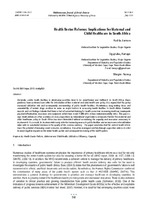Health sector reforms: implications for maternal and child healthcare in South Africa

View/
Date
2013-07Author
Jumare, Fadila
Ogujiuba, Kanayo
Stiegler, Nancy
Metadata
Show full item recordAbstract
Generally, public health facilities in developing countries tend to be underfunded and inefficient. In South Africa, these problems have continued even after the introduction of free maternal and child health care policy. It is argued that this policy increased utilization rate and consequently overcrowding of public health facilities. Nonetheless, long waiting times and unavailability of certain drugs continue to serve as major barriers to accessing health facilities in South Africa. Available records and our findings indicate that there is lack of consistent training for health personnel, increasing workload, inadequate physical infrastructure, resources and equipment, which have made it difficult to reduce maternal mortality rates. This paper xrays health reforms in other countries vis-à-vis propositions by international organizations and posits that the free maternal and child healthcare policy in South Africa has been formulated without considering the capacity and resources necessary to implement it. As a result, its implementation only aided in increasing access to public facilities and an improvement in utilization rates with no substantial increase in the quality of the services delivery. The paper concludes that the current health reform have the potential of reducing social exclusion, nonetheless, it must be managed carefully through supportive actions in order to avoid negative impacts on the wider health system and consequent worsening of the health system.
